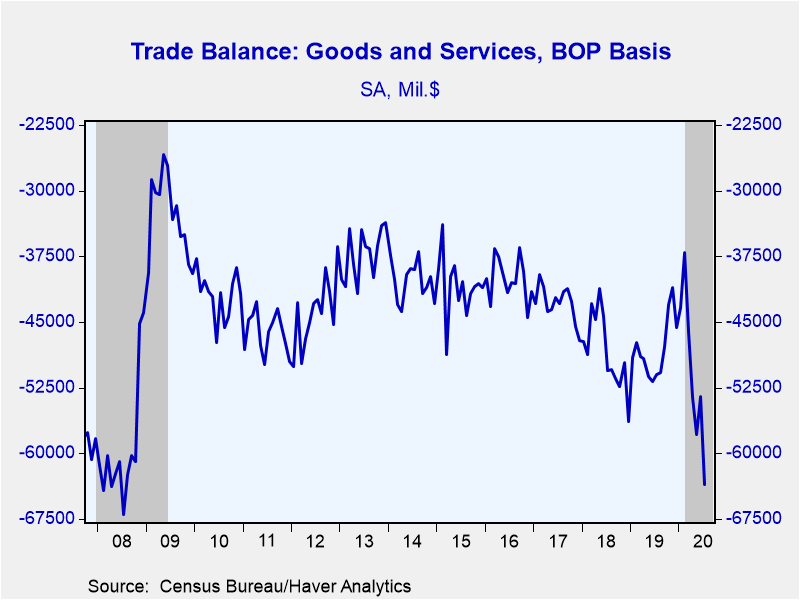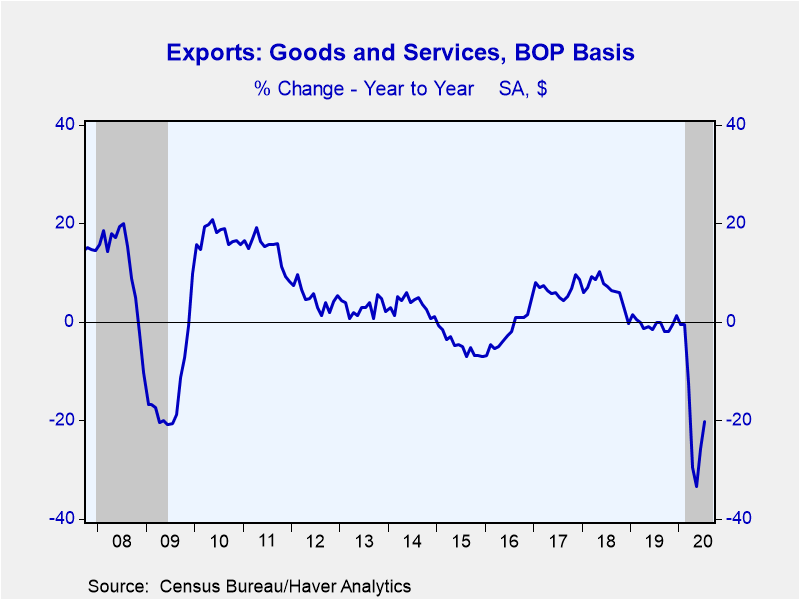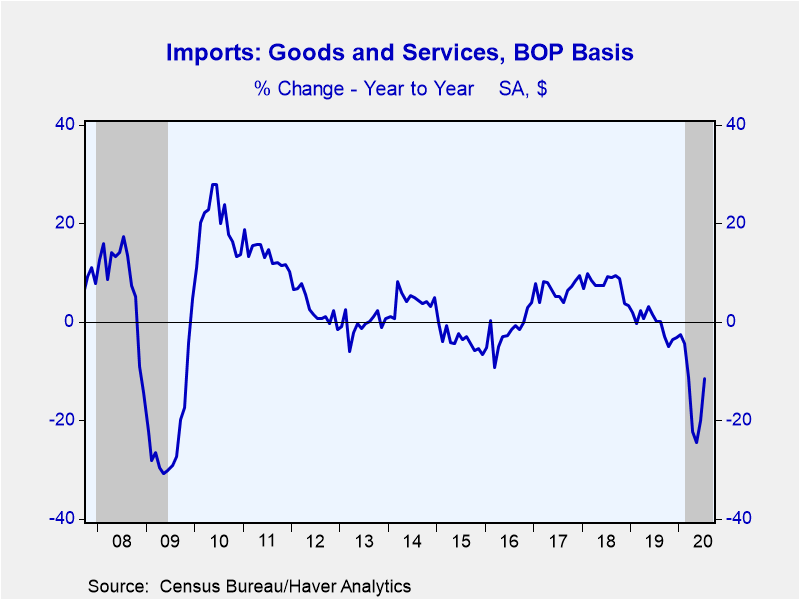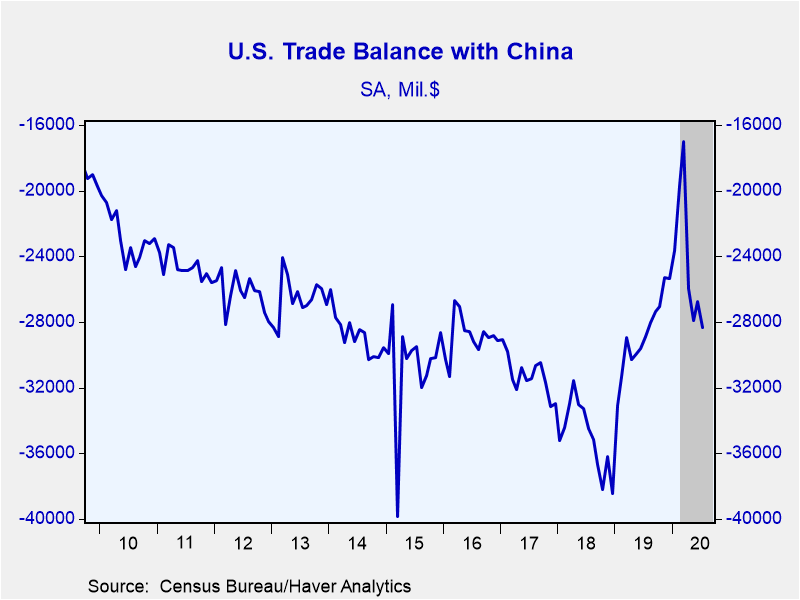 Global| Sep 03 2020
Global| Sep 03 2020U.S. Trade Deficit Deepens Unexpectedly in July
by:Tom Moeller
|in:Economy in Brief
Summary
• Imports strengthen; oil prices jump. • Export gain remains firm. The U.S. trade deficit in goods and services ballooned to $63.56 during July from $53.46 billion in June, revised from $50.7 billion. A $52.7 billion deficit had been [...]
• Imports strengthen; oil prices jump.
• Export gain remains firm.
The U.S. trade deficit in goods and services ballooned to $63.56 during July from $53.46 billion in June, revised from $50.7 billion. A $52.7 billion deficit had been expected in the Action Economics Forecast Survey. Exports increased 8.1% (-20.1% y/y) following a 9.6% strengthening. These increases followed sharp declines from March to May. Imports jumped 10.9% (-11.4% y/y) and added to June's 4.6% gain as the economy rebounded following the coronavirus shutdown.
The nominal deficit in goods trade surged to a record $80.1 billion in July from $71.0 billion. This compares to a $79.3 billion deficit in the advance report issued last week. Exports of goods jumped 12.0% (-15.7% y/y) as automotive exports surged 46.3% (-12.2% y/y) after strengthening 144.5% in June. Imports of goods rose 12.4% (-7.2% y/y), also driven by a 41.5% gain in auto imports (-18.7% y/y) after they roughly doubled in June. Petroleum imports gained 15.9% (-51.8% y/y) as oil prices and petroleum import volumes increased. Non-petroleum imports increased 12.2% (-3.3% y/y). The real goods trade balance surged to $90.5 billion (chain-weighted 2012$) in July, nearly equaling the record of $91.1 billion in December 2018. (These figures date back to January 1994.)
The surplus on trade in services deepened to $17.4 billion from a revised $18.2 billion in June. (Recent figures were revised sharply narrower.) The value of services exports grew 0.7% (-27.9% y/y) led by a 7.3% gain in transport services (-48.1%). Charges for the use of intellectual property rose 1.6% (-9.8% y/y). Imports of services grew 3.5% (-28.6% y/y) also led by a 10.4% rise in transport services (-44.1% y/y). Charges for use of intellectual property rose 3.4% (-3.3% y/y).
The seasonally adjusted goods trade deficit with China deepened to $28.3 billion in July, the largest shortfall in twelve months. Exports rose 1.2% (3.9% y/y) while imports increased 4.8% (-0.5% y/y). The trade deficit with Japan widened to $3.4 billion as exports fell 3.1% (-27.7% y/y) and imports rose 21.7% (-34.4% y/y). The trade deficit with the European Union was unchanged at $13.1 billion; exports rose 22.0% (-11.1% y/y) and imports gained 12.0% (-14.5% y/y).
The international trade data, including relevant data on oil prices, can be found in Haver's USECON database. Detailed figures on international trade are available in the USINT database. The expectations figures are from the Action Economics Forecast Survey, which is carried in AS1REPNA.
The Fed's latest Beige Book covering regional economic conditions can be found here.
| Foreign Trade in Goods & Services (Current $) | Jul | Jun | May | Jul Y/Y | 2019 | 2018 | 2017 |
|---|---|---|---|---|---|---|---|
| U.S. Trade Deficit ($ bil.) | 63.56 | 53.46 | 57.86 | 51.04 | 576.86 | 579.94 | 513.79 |
| Exports of Goods & Services (% Chg) | 8.1 | 9.6 | -3.8 | -20.1 | -0.4 | 6.4 | 6.7 |
| Imports of Goods & Services (% Chg) | 10.9 | 4.6 | -0.6 | -11.4 | -0.5 | 7.5 | 6.7 |
| Petroleum (% Chg) | 15.9 | 16.9 | -2.0 | -51.8 | -14.0 | 20.8 | 27.2 |
| Nonpetroleum Goods (% Chg) | 12.2 | 4.7 | -0.6 | -3.3 | -0.4 | 7.4 | 5.5 |
Tom Moeller
AuthorMore in Author Profile »Prior to joining Haver Analytics in 2000, Mr. Moeller worked as the Economist at Chancellor Capital Management from 1985 to 1999. There, he developed comprehensive economic forecasts and interpreted economic data for equity and fixed income portfolio managers. Also at Chancellor, Mr. Moeller worked as an equity analyst and was responsible for researching and rating companies in the economically sensitive automobile and housing industries for investment in Chancellor’s equity portfolio. Prior to joining Chancellor, Mr. Moeller was an Economist at Citibank from 1979 to 1984. He also analyzed pricing behavior in the metals industry for the Council on Wage and Price Stability in Washington, D.C. In 1999, Mr. Moeller received the award for most accurate forecast from the Forecasters' Club of New York. From 1990 to 1992 he was President of the New York Association for Business Economists. Mr. Moeller earned an M.B.A. in Finance from Fordham University, where he graduated in 1987. He holds a Bachelor of Arts in Economics from George Washington University.
More Economy in Brief
 Global| Feb 05 2026
Global| Feb 05 2026Charts of the Week: Balanced Policy, Resilient Data and AI Narratives
by:Andrew Cates










